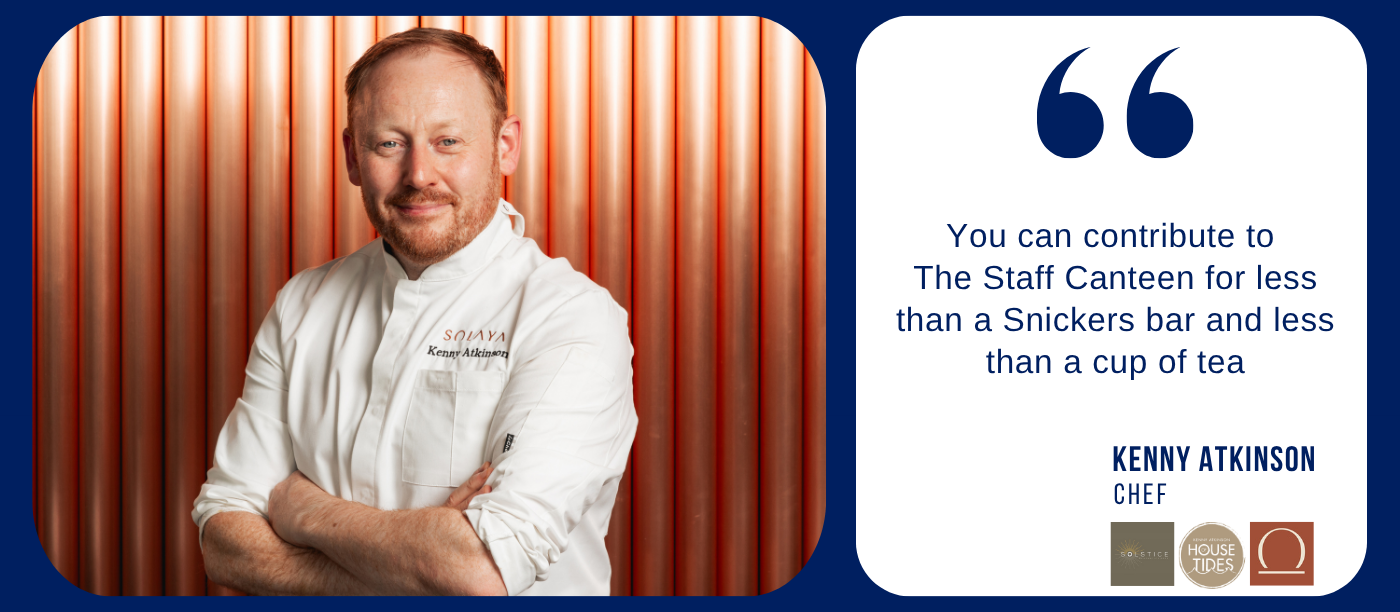Robin Gill started to train as an electrician before realising he wanted to be in the kitchen. He has trained in several top restaurants, including Don Alfonso 1890 and Le Manoir before deciding to open his own restaurant, The Dairy, in 2013.
Since then Robin and his team have received a number of accolades including this year being in the top 50 of the Good Food Guide 2016 and being being given the Editor's Award for Chef of the Year. He has also opened two other restaurants The Manor and Paradise Garage and The Delicatessen next to The Dairy.
The Staff Canteen spoke to Robin about using offal, his fascination with fermenting and teaching young chefs old techniques to protect the future of the industry.

Why did you want to be a chef?
I come from a showbiz background - my father was a musician and my mother was a choreographer and director; so I didn’t really know what I wanted to be. I didn’t do well at school as I was a bit of a dreamer and I just wanted to get into a trade. I was always cooking at home and my aunty had a farm in West Cork, where they cured their own meats, they had pigs and an organic vegetable farm.
So, I’ve always been involved in food but I chickened out of going to college and started training to be an electrician. But I realised I had no interest in that at all and as soon as I stepped into a kitchen I was completely hooked. You got the bug? Yes, definitely – I went into a really stressful, big covers brasserie in Dublin. It was just this incredible, exhilarating service that I was drawn too.
What have the highlights been in your journey from stepping into the industry to opening the dairy?
I spent a good ten years learning my trade, taking a dip in my salary and going in to great restaurants as a CDP or even a demi. My time spent at the Oak Room with Marco Pierre White was a real eye opener. I thought I would never go back into Michelin because I didn’t want to do those sorts of hours but when I stepped out of it I had a sense of guilt. I ended up going to Don Alfonso 1890 a two star in Italy which had its own farm. That was my first experience of real seasonality and farm to table. It had a real impact on me, much more than I realised at the time.
From there I went to Raymond Blanc’s Le Manoir, it had a similar ethos and amazing training. I did every single section there and left as a sous chef. It was a really good grounding as a chef but I still didn’t know where I wanted to go with it and what I wanted to do. I wanted a good work life and family life balance – I didn’t want to be in the kitchen all the time. I decided I didn’t want to do fine dining as such, I wanted to do excellent quality cooking but in a much more relaxed environment.
I took six months off and did a lot of travelling around Scandinavia, Spain and France and on that journey I really nailed the type of cooking I wanted to do. Then I opened The Dairy and its a little bit of everything I’ve experienced – it has its own rooftop, we have beehives, a little delicatessen and it has a real farm to table feel to the place.
It sounds like you had a plan for The Dairy before you opened it?
Yes, I knew exactly what kind of cooking I wanted to do and I wanted to take a real back to basics approach. I wanted less on the plate and more about the fundamental things like our oil, our butter, our breads, our own salamis and cured meats. I really wanted to learn that and all the pickling and curing. The Dairy was a late night bar I had wanted to do a pop up in, the building came up for sale and I scrambled around borrowing money off friends and family so I could buy it and that’s how it happened.
You’ve had some great recognition this year, including Chef of the Year in the Good Food Guide. It must feel like everything is paying off?
I wasn’t expecting any of it at all – our hopes were to be busy and do well, that was our only dream so, getting recognition from such big publications was completely unexpected. Credit to the team I have as it’s a real melting pot of ideas and there is not one dish on the menu which is entirely mine or theirs, it’s a big collaboration on everything. I almost feel guilty getting those rewards as it’s a real team effort. 
So the menu at The Dairy is down to the whole team not just yourself?
I wrote the first couple of menus but then I went to my team and said ‘this is what I want to do, how should we approach it?’ And it has continued like that, it’s always ingredients led and there are three or four people involved in the development of the dishes.
What was the first dish you created for The Dairy?
There’s only one dish which is still on the menu to this day and that’s the salted caramel, cacao, malted barley ice cream but some of the other dishes come back in different forms. We do an amazing smoked cod dish, with cod’s roe, beets and sorrel in bread crumbs. But the dishes have evolved, every year when these ingredients



















